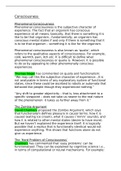College aantekeningen
Class notes on Consciousness and the Concept of AI intelligence (W_BA_PNEU)
Detailed notes on consciousness. Refers to multiple arguments, including the zombie argument and the global workspace theory. Consults advantages and disadvantages of different theories, as well as expert opinions and literature. What is phenomenal consciousness? What are the varieties of conscious...
[Meer zien]




